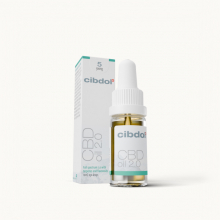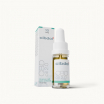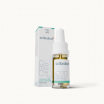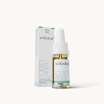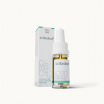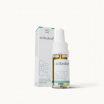Can CBD Oil Get You High?
Published:
CBD oil is gaining immense popularity these days. It seems like everyone is using it for various health benefits. But the million-dollar question is - can CBD oil get you high?
Contents:
- What is CBD Oil?
- Can CBD Oil Get You High?
- Why People May Think CBD Oil Gets Them High
- Common Myths About CBD Oil
- Side Effects of CBD Oil
- CBD Oil & the High Feeling Don't Go Together
- Is it Possible for CBD Oil to Get You High?
- Why Doesn't CBD Oil Get You High If It Comes From Cannabis?
- Can Trace Amounts of THC in CBD Oil Get You High?
- Is it Possible to Get High by Taking Very Large Doses of CBD Oil?
- Why Do Some People Say CBD Oil Gets Them High?
- Does CBD Oil Contain THC?
- Can Drug Dogs Detect CBD Oil?
- Will CBD Oil Cause a Failed Drug Test?
Many people assume CBD oil can get them high since it's derived from cannabis. But that's far from the truth.
CBD is completely different from THC, the compound in cannabis responsible for the high feeling. While THC has psychoactive effects, CBD does not.
In this post, we'll uncover the truth about CBD oil and discuss if it can really get you high or not. We'll also bust some common myths about CBD.

What is CBD Oil?
Before we understand if CBD oil can get you high, let's first understand what it is.
CBD, short for cannabidiol, is one of the 100+ compounds found in the cannabis plant. Unlike THC, CBD is completely non-psychoactive.
CBD oil is made by extracting CBD from the cannabis plant and diluting it with a carrier oil like hemp seed oil or coconut oil.
The CBD oils that are legal in most states contain less than 0.3% THC. Some CBD oils are THC-free as well.
So CBD oil contains negligible amounts of THC and does not produce any intoxicating effects.
Can CBD Oil Get You High?
Now coming to the main question - can CBD oil get you high?
The straight answer is NO. Since CBD oil contains little to no THC, it cannot get you high.
THC is the main psychoactive compound in cannabis that gives you the feeling of being 'stoned' or 'high'. It binds directly to the CB1 receptors in the brain and alters your mood, perception, consciousness, cognition, and behavior (1).
On the other hand, CBD does not bind directly to any cannabinoid receptor. Instead, it stimulates the endocannabinoid system indirectly and maintains homeostasis in the body.
So while THC can surely get you high due to its intoxicating ability, CBD does not have any such effects on the brain or body.
Numerous studies have confirmed that CBD does not cause any high, even in large doses (2).
In one study, volunteers were given soft gelatin capsules containing THC, CBD, or a placebo. Those who took THC reported psychoactive effects, while those who took CBD did not. The researchers concluded that CBD has no intrinsic psychoactive effects (3).
So no matter how much CBD oil you consume, it is simply impossible to get high or experience mind-altering effects from it.
Why People May Think CBD Oil Gets Them High
Now you may wonder, if CBD cannot get you high, why do some people say they feel high after taking it?
Well, there are a few reasons for this:
1. Placebo Effect
Some people may experience a placebo effect from taking CBD oil. They believe CBD oil will get them high, so they feel high. But in reality, the high comes from their expectation, not from CBD.
This placebo effect from CBD can cause relaxation, euphoria, and altered perception in some people. But the effects are very mild and completely different from the high caused by THC.
2. THC Trace Amounts
Another reason could be traces of THC in the CBD oil. As mentioned earlier, some CBD oils contain
However, those sensitive to THC may experience slight psychoactive reactions from the tiny THC traces. The reaction will be nowhere close to the high from marijuana use.
3. Mislabeling
In rare cases, CBD oil could be mislabeled to contain more THC than the legal limit. Consuming such oils with high THC could surely get you high.
To avoid buying such incorrectly labeled products, always purchase CBD oil from reputable brands that provide third-party lab reports. This will confirm the exact cannabinoid profile of the CBD oil.
So if someone says they felt high after taking CBD oil, it is likely due to one of the reasons above and not because CBD itself is intoxicating.
Common Myths About CBD Oil
There are several myths about CBD oil floating on the internet that need to be busted.
Myth #1: CBD Oil Contains THC
Wrong. Most CBD oils available legally contain less than 0.3% THC. Some are completely THC-free. Such small amounts are not enough to make you high.
Myth #2: CBD Oil is Marijuana
No. Although CBD oil is derived from cannabis just like marijuana, it contains very low THC levels that do not cause intoxication. CBD also has medicinal benefits unlike recreational marijuana.
Myth #3: CBD Oil is Addictive
Not true. Multiple studies have found that CBD does not have any addictive potential (4). You cannot get physically or psychologically addicted to CBD oil.
Myth #4: Higher Doses of CBD Oil Will Get You High
Another common myth is that high doses of CBD oil can induce psychoactive effects. But as proven by studies, CBD does not get you high irrespective of the dosage (5). Taking more CBD will only enhance its therapeutic effects.
These are some of the major myths about CBD oil that are simply not true. CBD is non-addictive and non-intoxicating, even in very high concentrations.
Side Effects of CBD Oil
Now you may think if CBD does not get you high, it must have zero side effects, right?
Well, that's untrue too. Just like any substance, CBD can also cause some mild side effects in certain individuals. These include:
- Dry mouth
- Drowsiness
- Drop in blood pressure
- Diarrhea
- Changes in appetite
- Fatigue
These side effects are quite rare and not experienced by most people. They are also very mild and resolve quickly on their own.
But it's important to be aware of these possible side effects before starting CBD oil, especially when taking it along with other medications.
CBD Oil & the High Feeling Don't Go Together
After going through the entire post, it's clear that CBD oil cannot get you high in any way, shape or form. The high feeling only comes from THC intake.
CBD works very differently by indirectly stimulating the endocannabinoid system. It does not bind to the CB1 receptors that make you high.
So taking even large amounts of CBD oil will NEVER intoxicate you or alter your state of mind. You can take it daily without any worries of addiction or getting stoned.
However, if you begin feeling 'high' after taking CBD oil, chances are there's some THC in it. Be very careful about the source and lab tests of the CBD oil in such a case.
I hope this post cleared all your doubts regarding CBD oil and getting high. Let me know in the comments below if you have any other questions!
Is it Possible for CBD Oil to Get You High?
No, CBD oil cannot get you high under any circumstances. CBD is non-intoxicating and does not produce psychoactive effects like THC does. This has been proven in multiple studies.
Why Doesn't CBD Oil Get You High If It Comes From Cannabis?
CBD and THC are two different compounds found in cannabis. THC gets you high by binding to CB1 receptors, but CBD does not bind directly to these receptors. Instead, it influences the endocannabinoid system indirectly to promote balance in the body.
Can Trace Amounts of THC in CBD Oil Get You High?
No, legally sold CBD oils contain less than 0.3% THC. This tiny amount does not trigger intoxication in most people. Those sensitive to THC may feel slight effects but nothing comparable to being high.
Is it Possible to Get High by Taking Very Large Doses of CBD Oil?
Multiple studies have shown that high doses of CBD do not cause intoxication. The side effects may increase with very high doses but CBD does not alter consciousness or make you high no matter the dosage.
Why Do Some People Say CBD Oil Gets Them High?
This can be due to the placebo effect, presence of THC traces, or mislabeled products. The feeling of being high from CBD oil is mainly psychological, not physiological. Properly sourced CBD oil will never get anyone high.
Does CBD Oil Contain THC?
Good quality CBD oils contain less than 0.3% THC which has no intoxicating effects. Some oils are also THC-free. CBD can be derived from hemp which contains negligible THC compared to marijuana strains.
Can Drug Dogs Detect CBD Oil?
Most drug dogs are not trained to detect CBD. However, some may alert handlers to the presence of CBD oil if it contains even minute traces of THC. The dogs likely pick up the THC smells, not the CBD.
Will CBD Oil Cause a Failed Drug Test?
Pure CBD likely will not make you fail a drug test. But some CBD products contain traces of THC that could accumulate over time and be detected on a sensitive drug test. Avoid full spectrum CBD right before a drug test.
I hope these answers help clarify that CBD oil under no circumstances can induce a high feeling, unlike THC. Let me know if you have any other questions!









